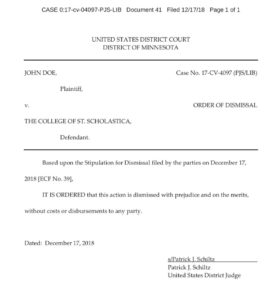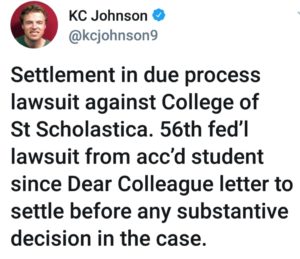NEW TITLE IX Rules Provide Protections for the Accused but They do Even More for Accusers
According to most news analyses, the U.S. Department of Education’s proposed rule changes for handling sexual misconduct and harassment on college campuses strengthen the rights of the accused at the expense of the victim. But those headlines ignore the substantial powers the new rules grant to survivors. Not only do those rules prove that the rights of both parties are not mutually exclusive, but they also assume that survivors still deserve to be treated as functional human beings. Under the Obama-era guidelines, students who had been sexually assaulted or harassed were denied substantial decision-making processes. First, students had no choice in whether or not to report a case of nonconsensual sex or unwelcome sexual advances. Second, their judicial options were limited to a Title IX disciplinary panel. Third, the definition of sexual harassment privileged their fears over adult communication.
In contrast the proposed changes…
Require only one employee to coordinate and comply with the regulations, freeing faculty and staff members to provide support without triggering an investigation. This new rule will allow students to talk with others before deciding to initiate a complaint.
Allow colleges and universities to experiment with alternative forms of justice, such as mediation or restorative justice conferences. For some harmed students, a restorative justice conference, in which they have a chance to speak directly to the harming student, offers more healing than a highly regulated proceeding in front of a panel.
Under the previous guidelines, sexual harassment was defined as “unwelcome conduct of a sexual nature.” The person who determined whether or not the conduct was unwelcome was the person allegedly being harassed. That person’s subjective response drove the whole investigation. As long as the complainant felt ill at ease, the Title IX panel should find for the aggrieved party. Under the recent proposed changes, sexual harassment is any “unwelcome conduct on the basis of sex that is so severe, pervasive and objectively offensive that it effectively denies a person equal access to [the college’s] education program or activity.” Under this definition, it won’t be enough merely to claim one’s discomfort. The action must be offensive enough that other people will also find it objectionable. The benefit for survivors? This change in the definition will mean colleges will have to do a better job of clarifying collective norms. Instead of relying on individuals to police offensive encounters, the new guidelines will require campuses to adopt objective standards of decency, standards that will make it easier for aggrieved parties to voice their unease.
All three elements of Obama era Title IX rules made it harder for survivors to heal. So, yes, the new rules provide more protections for the accused, but they do even more for survivors. By treating survivors as capable decision makers and requiring communities to clarify social norms, students who have been harmed by the sexual advances of others will have a much greater chance of healing and getting on with their education.
insidehighered By Meg Mott











